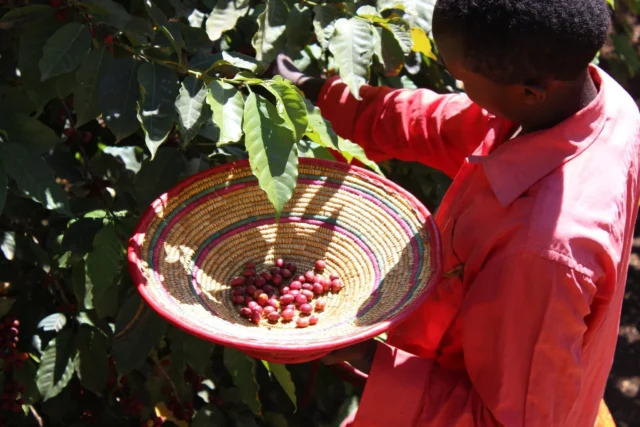
Coffee is more than just a delicious beverage that helps us jump-start our mornings. For many, it’s a daily ritual, a social connector, and even a source of cultural pride.
But as we savor our favorite brews, it’s important to remember the journey coffee beans take from farm to cup and the impact our choices can have on the lives of those who grow them.
In this article, we’ll explore the importance of ethical bean coffee and how supporting ethical practices in the coffee industry can make a difference. Read on to learn the details.
Origins of Ethically Sourced Coffee

Ethical bean coffee companies go the extra mile to source their beans from diverse countries known for their commitment to sustainable farming practices and fair labor conditions. These countries often include the following (among many others):
- Brazil
- Peru
- Honduras
- Mexico
- Colombia
- Guatemala
- Nicaragua
- Uganda
- Ethiopia
- Tanzania
- Kenya
- India
- New Guinea
- Bali
- Papua
Each country and region brings unique flavors and characteristics to the coffee, thanks to different climates, soil types, and cultivation methods. By choosing ethical bean coffee, you support responsible farming practices and embark on a global journey, discovering new tastes and aromas from around the world.
Sustainability Practices
Sustainability is at the heart of ethical bean coffee sourcing. Companies prioritizing sustainability understand that it’s fundamental to their long-term success and the planet’s well-being. They constantly monitor and improve their processes to ensure efficiency and minimal environmental impact.
One way they do this is by using packaging materials that are fully recyclable or compostable, like retail coffee bags and shipping materials. By opting for ethically sourced coffee, you’re helping to reduce waste and promote eco-friendly practices in the industry.
Why You Should Buy Ethically Sourced Coffee

If you’re already conscious about your food, you probably understand the importance of buying locally-grown, organic produce. You may even have a relationship with local farmers and have seen their firsthand methods of growth & harvesting. But attaining that level of transparency can be more challenging for imported goods such as coffee and chocolate.
Without a direct connection to the source, it’s difficult to determine if your coffee beans have been ethically sourced and sustainably grown. That’s why choosing ethical bean coffee from companies that prioritize transparency and responsible practices is crucial.
Understanding Ethically Sourced Coffee
You’ll want to look for labels indicating direct trade or fair trade practices when shopping for coffee beans. These certifications ensure that coffee you buy supports these farmers and the environment.
Fair trade coffee has certification by non-profit organizations like Fair Trade USA, which set strict rules for products to improve small farmers’ living conditions and promote sustainable practices. When you buy fair trade coffee, you’re contributing to sustainability initiatives and community development projects. These organizations also provide growers with resources and tools to improve their living standards.
Direct trade coffee involves a closer relationship between roasters and farmers, often cutting out middlemen. This allows for greater transparency and control of the quality & sustainability of the beans.
Quality Control and Social Sustainability

Ethical sourcing gives roasters better control over their beans’ quality. By working directly with farmers and adhering to strict certification standards, they can ensure their coffee meets high-quality benchmarks while promoting social sustainability. By ethical sourcing, coffee companies can establish mutually beneficial relationships with coffee farmers, fostering environmental responsibility and fair labor practices.
The Changing Face of the Coffee Industry
Historically, the coffee industry has been tainted by using underpaid and in some cases even forced labor abroad to cultivate and harvest its products. Thankfully, consumers have a growing awareness of injustices that are built into our food system, so coffee roasters who are independent are now stepping up to improve the overall industry.
By committing to ethical sourcing practices, these roasters forge stronger relationships with coffee farmers, ensuring their business is environmentally friendly and socially responsible. As consumers, we can support this positive shift in the industry by choosing ethically sourced coffee whenever possible.
FAQs About Ethical Bean Coffee

While we’ve covered many aspects of ethically sourced coffee in this article, some common questions might arise as you explore the world of ethical coffee. Here are three frequently asked questions that weren’t addressed in the article:
Does ethically sourced coffee cost more than conventional coffee?
While it’s true that ethically sourced coffee may sometimes come with a slightly higher price tag, this reflects the fair compensation provided to farmers and the investment in sustainable practices. By choosing ethical bean coffee, you support a more equitable and environmentally responsible coffee industry.
How can I be sure that the coffee I’m buying is ethically sourced?
Look for certifications like Fair Trade, Rainforest Alliance, or Direct Trade labels on the packaging. These certifications are backed by independent organizations that audit and verify the claims made by coffee producers. Research the roaster or brand to learn more about their sourcing practices and commitment to ethics.
What can I do if my favorite coffee shop doesn’t offer ethically sourced coffee?
Start by talking to the owners or managers and expressing your interest in ethically sourced coffee options. Share information about the benefits and importance of ethical sourcing, and encourage them to consider offering such products. You can also support coffee shops that prioritize ethical sourcing and vote with your wallet to show the demand for responsibly produced coffee.
The Importance Of Purchasing Ethical Bean Coffee: In Closing
As you enjoy your next cup of coffee, take a moment to reflect on the journey it took to reach you. By choosing ethically sourced coffee, you’re not only treating yourself to high-quality beans from around the world but also supporting sustainable farming practices, fair labor conditions, and a brighter future for the coffee industry.
Remember, every purchase you make has an impact. When you opt for ethical bean coffee, you’re sending a powerful message to the industry that you value transparency, fairness, and sustainability. So, savor that cup of coffee, knowing that you’re playing a part in making the world a better place, one brew at a time.









